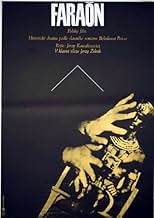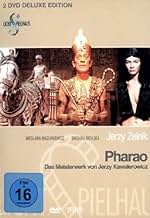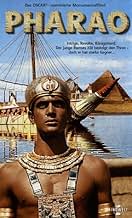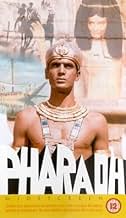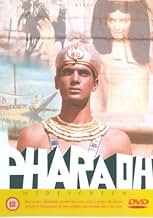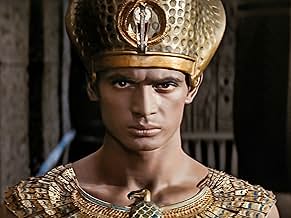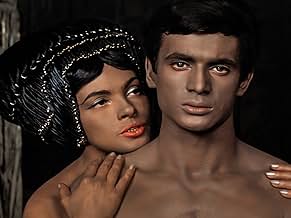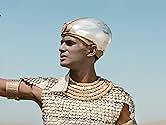VALUTAZIONE IMDb
7,3/10
2505
LA TUA VALUTAZIONE
Aggiungi una trama nella tua linguaYoung Pharaoh Ramses XIII clashes with Egypt's clergy over influence on the affairs of the state and its coffers.Young Pharaoh Ramses XIII clashes with Egypt's clergy over influence on the affairs of the state and its coffers.Young Pharaoh Ramses XIII clashes with Egypt's clergy over influence on the affairs of the state and its coffers.
- Regia
- Sceneggiatura
- Star
- Candidato a 1 Oscar
- 1 vittoria e 2 candidature totali
Barbara Brylska
- Kama - Priestess of Astharte
- (as Barbara Bryl)
Emir Buczacki
- Tutmosis - Ramses XIII's Friend
- (as Jerzy Buczacki)
Jerzy Block
- Fellah opening the channel
- (as Jerzy Blok)
Recensioni in evidenza
a subtle, bitter, cruel, cold story about the power. admirable adaptation of one of the important Polish novels of XIX century. and support of reflection about force of decisions and the value of good intentions. short, a great fascinating work. who impress not only for acting or costumes, fights and tension but for the realistic rebuild of an Egypt who becomes more than historical lesson. its grace, its terrible force of image and dialog, the new sense of a language who is perfect cloth for the story are virtues of a film who remains, almost half century, fascinating. and useful for understand history as a strange vehicle.
The first time I have seen the movie Pharaon directed by Kawalerovicz I was just a teenager. The movie have punched me like only a few things during my teenage years (some other movies,rock'n'roll songs,girls...). I really didn't remember why I was so fascinated with the movie but I have memory that movie have "something". Therefore it was the movie I have always wanted to see again. Some 30 years later finally I have a chance to see it again. Restored version. Still impressive after all this years. Excellent camera. True colours. Ancient Egypt as I have always imagined. Fine balanced rythm. Easy moving plot, enough mysterious to keep our attention. Everlasting story. Pure masterpiece, giving everyone different experience. Message? Like every piece of art, 1000 people will see it from 1000 different points of view. One have to keep in mind that movie have been made by polish filmmaker in the middle 60's, not necessary oponent of the polish establishment at the time, author who maybe have a certain standpoint to non-secular
matters. Specially keeping in mind his previous movie Joanne mother of angels. The movie is simply nice. Must see.
This movie is about the fight between a Pharaoh (Ramses XIII) and the spiritual power. Almost all the historical details were revised by egyptologist. Show the little power of the Pharaohs in the New Empire.
an important Polish novel. a special film, precise adaptation of the first. and atmosphere of an old empire. short - a kind of parable about power, illusion and generous plans. after decades, its basic force source is the delicacy of details and performances. the slow images, the links between politic and religion, economy and need of change, the supremacy of a group against the king will , the fragility of a young leader and the fall of each great state. the music, the images and the hard work to create a remarkable film. the emotions and the spirit of lost world. more than adaptation of Prus masterpiece, it is reflection of profound roots of each period. and that fact does it not only a form of history lesson but a seed for reflection about present.
Polish director Jerzy Kawalerowicz's long gestated film adaptation of Bolesław Prus' historical novel PHARAOH is an ambitious endeavor, dazzles in its epic scale and formalist gravitas with an exclusive Polish cast, which leads to one prescribed proviso: for purists, it is beggar belief to watch a movie about ancient Egyptians where everyone sports Polish through and through; but other than that, the film is a marvel orchestrated with vigor, mettle and pathos.
The story centers around the story of an apocryphal pharaoh Ramses XIII (a 20-year-old Zelnik graced with haughty handsomeness and solemness), whose hellbent effort to seize power and pecuniary autonomy over an ever-increasingly theocratic clutches of the clergy in the Ancient Egypt.
The movie opens with a static close-up of two scarabs, competing for their trophy, then reveals a throng of Egyptian soldiers marching in an expansive desert, and directly points out the strife between the young Ramses XIII and the High Priest Herhor (Pawlowski), in order to show reverence to the sacred scarabs, Herhor commands the troops to take a devious route which causes damage to the newly-built water channels, and a resultant suicide of the channel digger. The incident enrages Ramses XIII, and he vows to take down the clergy when he assumes the regalia.
That day would not be too long in waiting, but what also awaits him is an Egypt sapping in wealth and sway, the priests arrange unfavorable treaties with the neighboring Assyrians in order to keep warfare at bay, which ostensibly seems like a well-intentioned strategy to save the hoi polloi from the scourge of war, but the truth is, there is large amount of gold and other fortunes being squirreled away in the labyrinth of the priests' temple, nominally can be only appropriated when in exigency, which the High Priests would never grant in favor of feathering their own nests. This is the touch paper which Ramses XIII deploys to foment the masses against the clergy, in an attempt to take the latter down once for all. Sadly he is still wet in his ears, and the priests are not ready to back down without a fight.
As a historical saga, PHARAOH is unusually lean on action pieces and subdued in its chromatic approach, one could imagine if the story were to be transposed as a Hollywood tent-pole in a post- BEN-HUR (1959) era, all the glittering and grandiose would suffuse its majestic set, and battleground bedlam pumped up by polished fighting competence. Here, in a much less ostentatious and more internalized style (costumes are astonishingly designed in its originally exotic verisimilitude), what comes about is a tragic tale of one young man's over-confidence in his prowess against something far more sinister, deceptive and ruthless than he has ever imagined, with a sideswipe to the benighted mob, when an eclipse crops up, all hell broke loose and burrowing a hole in the ground is their knee-jerking reaction.
Performance-wise, the cast rounds out a mostly po-faced dourness even for those who are laughing in the end (with Pawlowski emanating the highest voltage), sometimes emotes a ghost of urgency but none-too ravishing to be brutally frank. Yet, it is Kawalerowicz's arduous effort to minutely visualize a mythical epoch when primitivity and obtuseness overlay the world, yet through a tall-tale where a spate of human frailties abound and speak volumes of what one can assimilate into today's circumstances, it galvanizes new audience with its ritualistic posture and beguiling aesthetic attributes.
The story centers around the story of an apocryphal pharaoh Ramses XIII (a 20-year-old Zelnik graced with haughty handsomeness and solemness), whose hellbent effort to seize power and pecuniary autonomy over an ever-increasingly theocratic clutches of the clergy in the Ancient Egypt.
The movie opens with a static close-up of two scarabs, competing for their trophy, then reveals a throng of Egyptian soldiers marching in an expansive desert, and directly points out the strife between the young Ramses XIII and the High Priest Herhor (Pawlowski), in order to show reverence to the sacred scarabs, Herhor commands the troops to take a devious route which causes damage to the newly-built water channels, and a resultant suicide of the channel digger. The incident enrages Ramses XIII, and he vows to take down the clergy when he assumes the regalia.
That day would not be too long in waiting, but what also awaits him is an Egypt sapping in wealth and sway, the priests arrange unfavorable treaties with the neighboring Assyrians in order to keep warfare at bay, which ostensibly seems like a well-intentioned strategy to save the hoi polloi from the scourge of war, but the truth is, there is large amount of gold and other fortunes being squirreled away in the labyrinth of the priests' temple, nominally can be only appropriated when in exigency, which the High Priests would never grant in favor of feathering their own nests. This is the touch paper which Ramses XIII deploys to foment the masses against the clergy, in an attempt to take the latter down once for all. Sadly he is still wet in his ears, and the priests are not ready to back down without a fight.
As a historical saga, PHARAOH is unusually lean on action pieces and subdued in its chromatic approach, one could imagine if the story were to be transposed as a Hollywood tent-pole in a post- BEN-HUR (1959) era, all the glittering and grandiose would suffuse its majestic set, and battleground bedlam pumped up by polished fighting competence. Here, in a much less ostentatious and more internalized style (costumes are astonishingly designed in its originally exotic verisimilitude), what comes about is a tragic tale of one young man's over-confidence in his prowess against something far more sinister, deceptive and ruthless than he has ever imagined, with a sideswipe to the benighted mob, when an eclipse crops up, all hell broke loose and burrowing a hole in the ground is their knee-jerking reaction.
Performance-wise, the cast rounds out a mostly po-faced dourness even for those who are laughing in the end (with Pawlowski emanating the highest voltage), sometimes emotes a ghost of urgency but none-too ravishing to be brutally frank. Yet, it is Kawalerowicz's arduous effort to minutely visualize a mythical epoch when primitivity and obtuseness overlay the world, yet through a tall-tale where a spate of human frailties abound and speak volumes of what one can assimilate into today's circumstances, it galvanizes new audience with its ritualistic posture and beguiling aesthetic attributes.
Lo sapevi?
- QuizPharaoh Ramses XIII is a fictional character. While the name Ramses/Ramesses was relatively common for Pharaohs of the 19th and and 20th Dynasties, there were only 11 historical Pharaohs of that name. Two of them were members of the 19th dynasty, and nine of them were members of the 20th dynasty.
- ConnessioniReferenced in Natchnij mnie wiara (1994)
I più visti
Accedi per valutare e creare un elenco di titoli salvati per ottenere consigli personalizzati
- How long is Pharaoh?Powered by Alexa
Dettagli
- Tempo di esecuzione2 ore 31 minuti
- Colore
- Mix di suoni
- Proporzioni
- 2.35 : 1
Contribuisci a questa pagina
Suggerisci una modifica o aggiungi i contenuti mancanti

